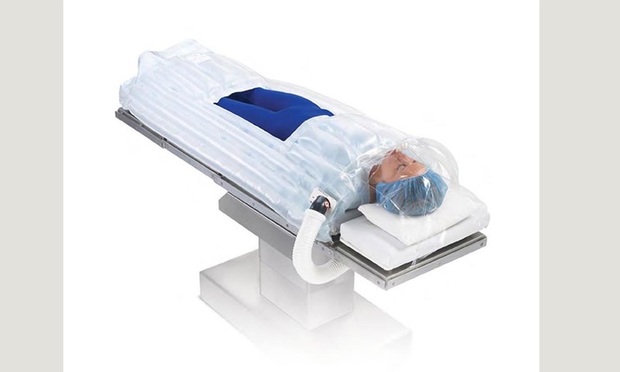Judge Tosses 5,000+ Lawsuits Over 3M's Bair Hugger Surgical Blankets
On Wednesday, U.S. District Judge Joan Ericksen of Minnesota granted 3M’s motion to exclude the plaintiffs’ general causation experts, effectively ending an MDL over Bair Hugger surgical blankets.
August 01, 2019 at 12:10 PM
4 minute read
 3M’s Bair Hugger device. Courtesy photo
3M’s Bair Hugger device. Courtesy photo
A federal judge has granted summary judgment against more than 5,000 lawsuits over 3M surgical warming blankets after she tossed the plaintiffs’ experts.
On Wednesday, U.S. District Judge Joan Ericksen of the District of Minnesota granted 3M’s motion for summary judgment that sought to exclude the plaintiffs’ general causation experts. The lawsuits, coordinated in multidistrict litigation, had alleged that the Bair Hugger Forced Air Warming system increased the risk of infection.
“There is no legitimate scientific support for the plaintiffs’ theory,” said Todd Fruchterman, general manager of 3M Medical Solutions Business, in a statement Thursday. “Most importantly, we want physicians and patients to understand that the practice of patient warming is supported by leading health care institutions, professional societies and the U.S. Food and Drug Administration. Our industry-leading 3M Bair Hugger system has been proven to be a safe, effective and efficient method of delivering patient warming therapy.”
Co-lead plaintiffs attorneys Genevieve Zimmerman of Meshbesher & Spence in Minneapolis and Gabriel Assaad of Kennedy Hodges and Kyle Farrar of Farrar & Ball, both in Houston, did not respond to requests for comment.
The U.S. Judicial Panel on Multidistrict Litigation coordinated the MDL over the Bair Hugger in 2015. Last year, a federal jury sided with 3M in the first bellwether trial, which ended in a defense verdict.
After trial, 3M filed a motion for Ericksen to reconsider a 2017 order on summary judgment. In its renewed motion for summary judgment, filed on Jan. 24, 3M cited newly released scientific research that refuted claims from plaintiffs’ attorneys that the Bair Hugger disrupts a protective “forcefield” around patients during surgery, an idea that plaintiffs’ own expert called “absolute rubbish” and “silly” during the first bellwether trial.
In a Feb. 21 response, plaintiffs’ attorneys countered there was no “new groundbreaking evidence” refuting their experts’ opinions and that 3M had engaged in a “game of semantics” and “thrown up yet another smokescreen of mischaracterizations and faux science in a blatant attempt to re-litigate settled issues of general causation.”
Ericksen ordered both sides to provide more details in a May 6 order, such as addressing the newly released scientific research and providing any studies excluding other causes of infection during surgeries.
That prompted 3M to criticize the “built-for-litigation methodology” of plaintiffs’ experts, citing the U.S. Court of Appeals for the Fourth Circuit’s ruling last year tossing the plaintiffs’ experts in 3,128 lawsuits over Pfizer’s cholesterol drug Lipitor.
“Plaintiffs’ science is manufactured for the courtroom. It is not real science, it is not reliable, and it should be excluded,” wrote Benjamin Hulse, a partner at Blackwell Burke in Minneapolis, in a May 16 brief.
In their own May 16 brief, plaintiffs’ attorneys said the judge’s questions focused on specific, not general causation, and noted that a federal magistrate judge rejected their request earlier this year to depose the authors of the new scientific research that 3M cited.
On Wednesday, Ericksen granted 3M’s motion for summary judgment to exclude plaintiffs expert testimony. She directed the court clerk to enter judgment on “all remaining member cases in this MDL.”
Her memorandum outlining her reasons was under seal, but her order said she would unseal the document after lawyers on both sides submit suggestions for redactions by Aug. 6.
According to 3M’s press release, a Minnesota Court of Appeals decision six months earlier had upheld dismissal of 61 other Bair Hugger cases in state court.
The ruling has no impact on two cases remaining in state courts—one in Missouri, and one in Texas. It also comes after lawyers in the MDL have lobbed sanctions against one another, with 3M accusing plaintiffs attorneys of disclosing sealed documents as part of a motion to compel in the Texas state court case.
A federal magistrate judge in Minnesota heard arguments July 16 but has yet to rule on the sanctions motions.
This content has been archived. It is available through our partners, LexisNexis® and Bloomberg Law.
To view this content, please continue to their sites.
Not a Lexis Subscriber?
Subscribe Now
Not a Bloomberg Law Subscriber?
Subscribe Now
NOT FOR REPRINT
© 2025 ALM Global, LLC, All Rights Reserved. Request academic re-use from www.copyright.com. All other uses, submit a request to [email protected]. For more information visit Asset & Logo Licensing.
You Might Like
View All

4th Circuit Upholds Virginia Law Restricting Online Court Records Access
3 minute read
Plaintiffs Attorneys Awarded $113K on $1 Judgment in Noise Ordinance Dispute
4 minute readTrending Stories
- 1'A Long 6 Years': No $150M for Goldman Sachs Investors
- 2Ex-Appellate Court Judges Launch Boutique Focused on Plaintiffs Appeals
- 3Judge Tanks Prevailing Pittsburgh Attorneys' $2.45M Fee Request to $250K
- 4Attorneys Leading $10M Pension Settlement Against CITGO Score $4M Payday
- 5HUD Charges Texas HOA With Housing Discrimination in Last Days of Biden Administration
Who Got The Work
J. Brugh Lower of Gibbons has entered an appearance for industrial equipment supplier Devco Corporation in a pending trademark infringement lawsuit. The suit, accusing the defendant of selling knock-off Graco products, was filed Dec. 18 in New Jersey District Court by Rivkin Radler on behalf of Graco Inc. and Graco Minnesota. The case, assigned to U.S. District Judge Zahid N. Quraishi, is 3:24-cv-11294, Graco Inc. et al v. Devco Corporation.
Who Got The Work
Rebecca Maller-Stein and Kent A. Yalowitz of Arnold & Porter Kaye Scholer have entered their appearances for Hanaco Venture Capital and its executives, Lior Prosor and David Frankel, in a pending securities lawsuit. The action, filed on Dec. 24 in New York Southern District Court by Zell, Aron & Co. on behalf of Goldeneye Advisors, accuses the defendants of negligently and fraudulently managing the plaintiff's $1 million investment. The case, assigned to U.S. District Judge Vernon S. Broderick, is 1:24-cv-09918, Goldeneye Advisors, LLC v. Hanaco Venture Capital, Ltd. et al.
Who Got The Work
Attorneys from A&O Shearman has stepped in as defense counsel for Toronto-Dominion Bank and other defendants in a pending securities class action. The suit, filed Dec. 11 in New York Southern District Court by Bleichmar Fonti & Auld, accuses the defendants of concealing the bank's 'pervasive' deficiencies in regards to its compliance with the Bank Secrecy Act and the quality of its anti-money laundering controls. The case, assigned to U.S. District Judge Arun Subramanian, is 1:24-cv-09445, Gonzalez v. The Toronto-Dominion Bank et al.
Who Got The Work
Crown Castle International, a Pennsylvania company providing shared communications infrastructure, has turned to Luke D. Wolf of Gordon Rees Scully Mansukhani to fend off a pending breach-of-contract lawsuit. The court action, filed Nov. 25 in Michigan Eastern District Court by Hooper Hathaway PC on behalf of The Town Residences LLC, accuses Crown Castle of failing to transfer approximately $30,000 in utility payments from T-Mobile in breach of a roof-top lease and assignment agreement. The case, assigned to U.S. District Judge Susan K. Declercq, is 2:24-cv-13131, The Town Residences LLC v. T-Mobile US, Inc. et al.
Who Got The Work
Wilfred P. Coronato and Daniel M. Schwartz of McCarter & English have stepped in as defense counsel to Electrolux Home Products Inc. in a pending product liability lawsuit. The court action, filed Nov. 26 in New York Eastern District Court by Poulos Lopiccolo PC and Nagel Rice LLP on behalf of David Stern, alleges that the defendant's refrigerators’ drawers and shelving repeatedly break and fall apart within months after purchase. The case, assigned to U.S. District Judge Joan M. Azrack, is 2:24-cv-08204, Stern v. Electrolux Home Products, Inc.
Featured Firms
Law Offices of Gary Martin Hays & Associates, P.C.
(470) 294-1674
Law Offices of Mark E. Salomone
(857) 444-6468
Smith & Hassler
(713) 739-1250









